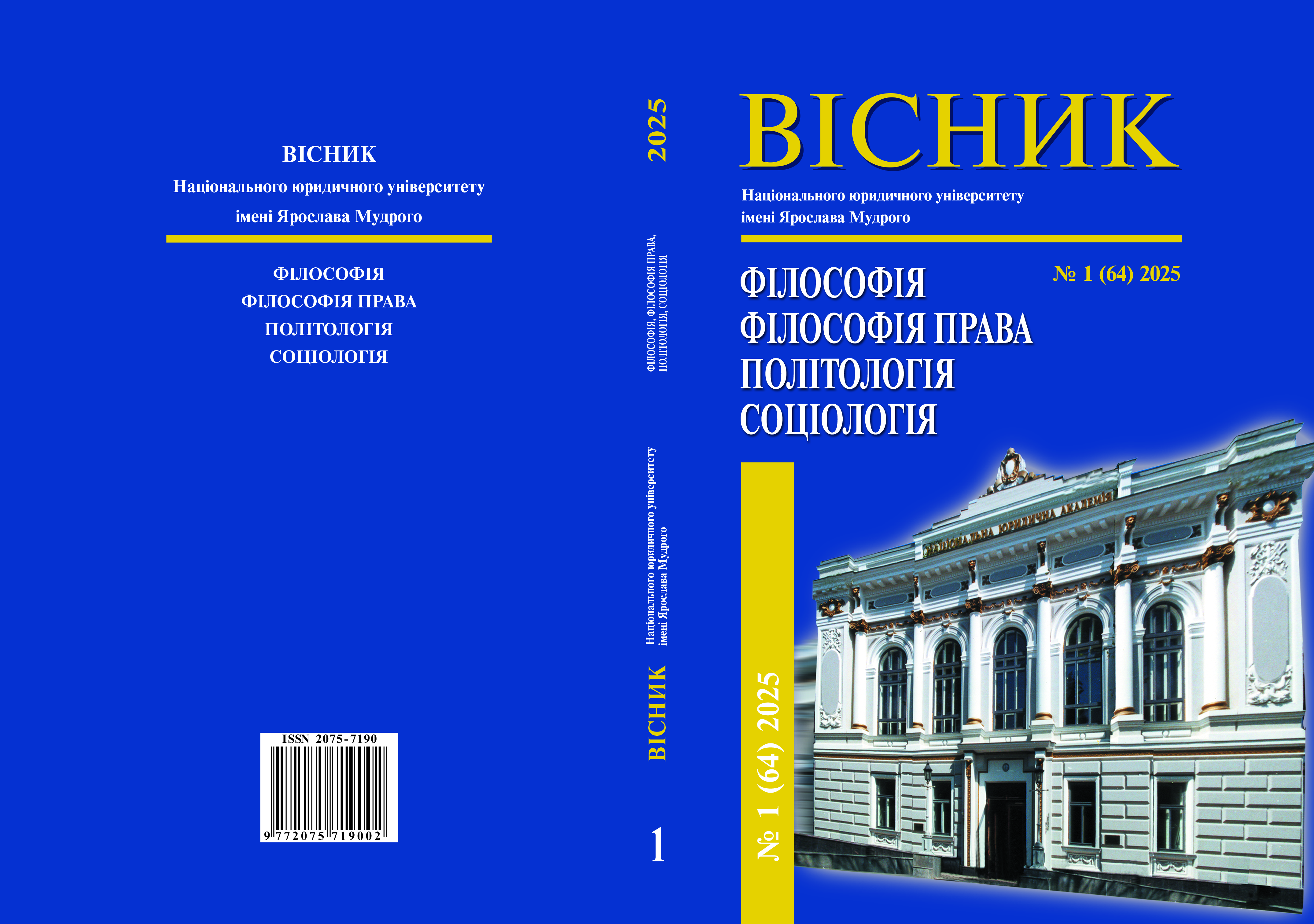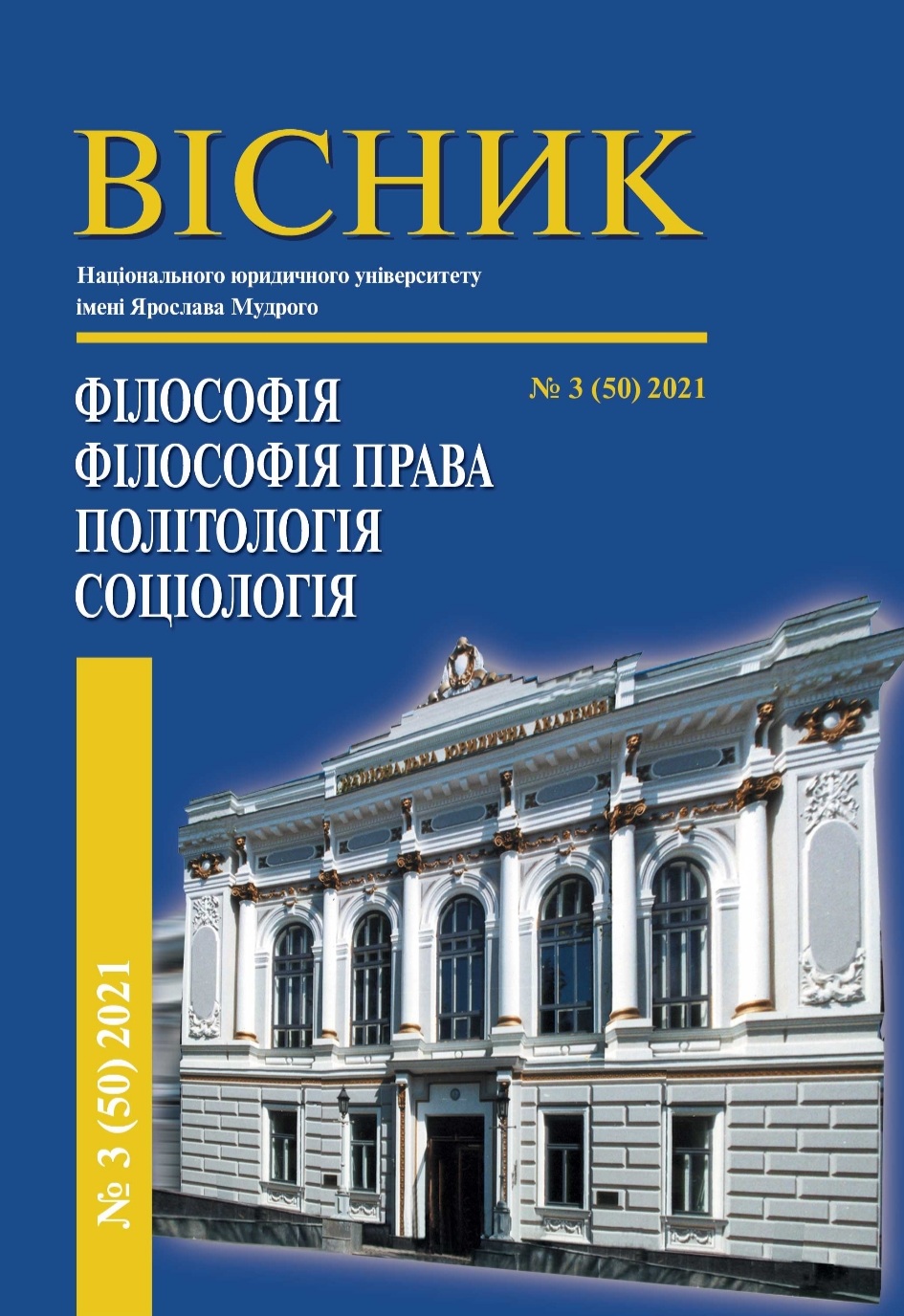НОВІ ПРОСТОРОВІ ЛОКАЛЬНОСТІ У НОМАДИЧНОМУ БУТТІ: ПОСТМОДЕРНІСТСЬКИЙ КОНТЕКСТ
DOI:
https://doi.org/10.21564/2663-5704.64.324502Ключові слова:
номадизм, постмодерн, простір сучасного міста, номадична ідентичністьАнотація
У статті розглянуті особливі умови формування номадичного способу життя доби постмодерну. Сучасний соціокультурний простір міст представлений як середовище, де виникають специфічні локальності, що сприяють номадизації, – «не-місце» та «діра». «Не-місце» осмислене як канал безупинного руху, позбавлений історичності, та такий, що утворює розсіювання суб’єктної ідентичності. «Діра» показана як вузол зіткнення різноспрямованих потоків, що передбачає первинне уповільнення номада для здійснення вільного заглиблення у «не-місце». Показано, що виникнення «не-місць» зв’язане з процесом наративізації місць, конструювання їх за допомогою знаків, що, у підсумку, веде до того, що місце стає відсутнім для самого себе («не-місцем»).
Посилання
Getman, A.P., Danilyan, O.G., Dzeban, A.P., Kalynovskyi, Yu.Yu. (2023). Modern ontology: reflection on the continuity of cyberspace and virtual reality. Revista de Filosofía, Vol. 39, 102, 78–94.
Therborn, G. (2009). Les Sociétés d’Europe du XXe et XXIe siècles: la fin de la modernité européenne? Paris: Armand Colin [in French].
Deleuze, G., Guattari, F. (1987). A Thousand Plateaus: Capitalism and Schizophrenia. London, Minneapolis: University of Minnesota Press. URL: https://files.libcom.org/files/A%20Thousand%20Plateaus.pdf.
Deleuze, G., Guattari, F. (1986). Nomadology: The War Machine. New York: Semiotext(e)
Heidegger, М. (1969). Die Kunst und der Raum. Sankt Gallen: Erker [in German].
Lefebvre, H. (1984). The production of space. Oxford: Basil Blackwell Ltd. https://iberian-connections.yale.edu/wp-content/uploads/2020/04/The-production-of-space-by-Henri-Lefebvre-translated-by-Donald-Nicholson-Smith.pdf
Augé, М. (2008). Non-Places. London, New-York: Verso. https://monoskop.org/images/c/c4/Auge_Marc_Non-Places_Introduction_to_an_Anthropology_of_Supermodernity_2nd_ed_2008.pdf
Certeau, M. de. (1990). L‘Invention du quotidien. Paris: Gallimard. https://archive.org/details/de-certeau-giard-linvention-du-quotidien-ocr/page/155/mode/2up [in French].
Koolhaas, R. (2002). Junkspace. Obsolescence, 100, 175–190.
Gallardo Frías, L. (2015) No-lugar y arquitectura: Reflexiones sobre el concepto de No-lugar para la arquitectura contemporánea. Arquiteturarevista, 11, 2, 104–115 [in Spanish].
Gebauer, M., Nielsen, H.T., Schlosser, J.T., Sørensen, B. (Eds.) (2015). Non-Place: Representing Placelessness in Literature, Media and Culture. Aalborg: Universitetsforlag. Interdisciplinære kulturstudier. https://vbn.aau.dk/ws/portalfiles/portal/215746442/Non_Place_OA.pdf
Legnaro, A. (2015). In Search of Place-ness: Non-Places in Late Modernity. (2015). Non-Place: Representing Placelessness in Literature, Media and Culture. Gebauer, M., Nielsen, H. T., Schlosser, J. T., & Sørensen, B. (Eds.) Aalborg: Universitetsforlag. Interdisciplinære kulturstudier, 51–69. https://vbn.aau.dk/ws/portalfiles/portal/215746442/Non_Place_OA.pdf
Merriman, P. (2009). Marc Augé on Space, Place and Non-Place. Irish Journal of French Studies, 9, 9–29. https://doi.org/10.7173/16491335.2009.09.01.009
Dubrowska, M. (2024). Non-Places of Memory in Selected Third-Generation Prose: Postmemorial, Desintegrative, Transnational. Roczniki Humanistyczne, Vol. 72, 5, 95–112. doi: https://doi.org/10.18290/rh24725.6
Kalynovskyi, Y.Y., Danilyan, O.G., Dzoban, O.P. (2024). The value and security role of knowledge in the sociocultural space of modernity. Cogito, Vol. XVІ, 3, 20–41.
Hardt, M., Negri, A. (2000). Empire. Cambridge: Harvard University Press. https://files.libcom.org/files/Empire.pdf
Debord, G. (1994). Society of the Spectacle. New York: Zone Books.
Debord, G. (1990). Comments on the Society of the Spectacle. London: Verso
Saad, B. (2021). Spatial experience, spatial reality, and two paths to primitivism. Synthese, 199 (Suppl 2), 469–491. https://doi.org/10.1007/s11229-019-02410-7
Lévi-Strauss, C. (2011). Tristes Tropiques. London: Penguin [in French].
Bauman, Z. (2000). Liquid Modernity. Cambridge: Polity Press. https://giuseppecapograssi.wordpress.com/wp-content/uploads/2014/01/bauman-liquid-modernity.pdf
Danilyan, О., Dzoban, О., Kalynovskyi, Y., Saltanov, М. (2023). Value aspects of the safe existence of social systems in an unstable world. Cogito, Vol. XV, 4, 60–78.
Danilyan, O., Dzоban, О., Lasnibat, F. (2024). Implementation of the Right to Privacy in the Context of the Restrictive Impact of Modern Information Technologies. Theory and Practice of Jurisprudence, 2 (26), 44–56.
Certeau, M. de (1988). The Practice Of Everyday Life. Berkeley, Los Angeles, London: University Of California Press. https://www.academia.edu/28684801/THE_PRACTICE_OF_EVERYDAY_LIFE
Lynch, K. (2007). A boa forma da cidade. Lisboa: Edições 70 [in Portuguese].
Jameson, F. (1998). Postmodernism and Consumer Society. The Cultural Turn. Selected Writings on the Postmodern 1983-1998. London: Verso. https://analepsis.org/wp-content/uploads/2011/01/jameson.pdf
Lacan, J. (1979). The Four Fundamental Concepts of Psychoanalysis. London: Penguin.
Dolar, M. (2013). The Atom and the Void – from Democritus to Lacan. Filozofski vestnik, Vol. XXXIV, 2, 11–26 https://ojs.zrc-sazu.si/filozofski-vestnik/article/download/3251/2968
Deleuze, G., Guattari, F. (1983). Anti-Oedipus: Capitalism and Schizophrenia. Minneapolis: University of Minnesota Press. https://archive.org/details/anti-oedipus/page/5/mode/2up
The Seminar of Jacques Lacan (Ed. J.-A. Miller) (1988). II. The Ego in Freud's Theory and in the Technique of Psychoanalysis 1954-1955. Cambridge: Cambridge University Press.




